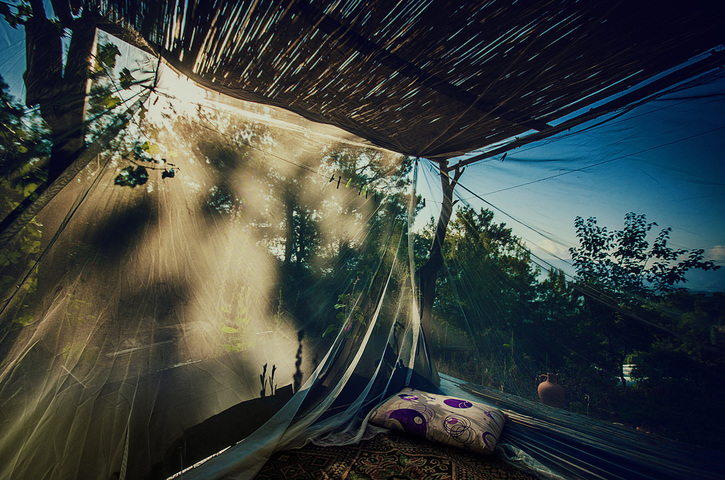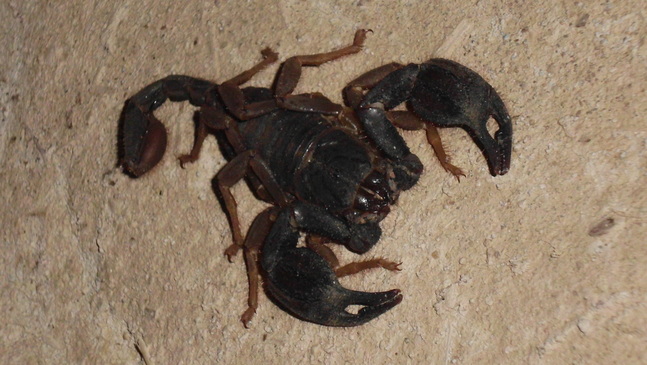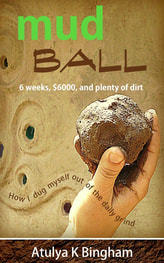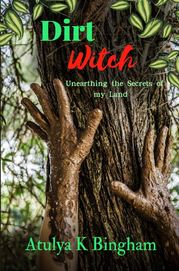|
|
Tiny Off-Grid Life |
DEALING WITH CRITTERS AND PESTS
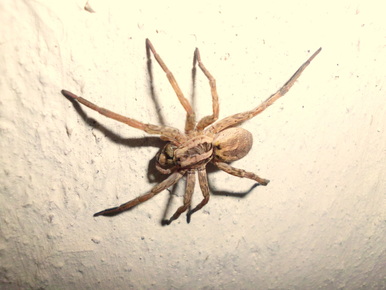 Tegenaria spider on my kitchen wall.
Tegenaria spider on my kitchen wall.
Dealing with bugs, critters and pests in your home.
Off-grid living involves nature. Plenty of it. So dealing with beasties is something you’re engaged with every day. Wildlife changes depending on your locality, but some tips can prove useful wherever you are. Here are my strategies for dealing with the multi-legged and no legged on The Mud.
1. Know your patch.
I’ve found it really pays to slow down and know your environment, what’s in it, what it can do for you and your ecosystem. My approach to wildlife is not everyone’s. But I learned after living on the land for eight months in a tent that nearly every critter can be helpful if you observe it. I try to kill almost nothing (mosquitos, ticks and fleas still incur my wrath). One reason is that killing simply doesn’t work. It doesn’t prevent infestations, nor rid you of bugs. They just keep on coming.
Here are a few more effective ways of dealing with critters and stingy bugs.
2. Lime
I’m often asked how to protect mud homes from the various small attackers out there. My answer is a lime wash. I only lime-washed the walls after two years, so am in a position to compare with and without. Lime is amazing stuff. It keeps out fire ants, mud-burrowing bugs, slugs and termites, and deters many other insects too. It has an anti-sceptic quality that renders your space infestation free. You can lime wash chicken coops, tree trunks and animal pens with the same results.
3. Mosquito nets (not just for mosquitos)
I don’t know who invented the mozzie net, but I want to kiss them. It is by far the most efficient, least poisonous way of dealing with airborne stingy insects, and I’m surprised how few people use them. I have all kinds of nets for various spaces. Small ones for hammocks, medium-sized ones for a bed, and two years ago I had a huge one made to cover my entire gazebo. It’s the best $10 I’ve spent. Now I have what is basically an entire outside room that is mosquito, fly, wasp, sandfly, hornet, spider and scorpion free.
Off-grid living involves nature. Plenty of it. So dealing with beasties is something you’re engaged with every day. Wildlife changes depending on your locality, but some tips can prove useful wherever you are. Here are my strategies for dealing with the multi-legged and no legged on The Mud.
1. Know your patch.
I’ve found it really pays to slow down and know your environment, what’s in it, what it can do for you and your ecosystem. My approach to wildlife is not everyone’s. But I learned after living on the land for eight months in a tent that nearly every critter can be helpful if you observe it. I try to kill almost nothing (mosquitos, ticks and fleas still incur my wrath). One reason is that killing simply doesn’t work. It doesn’t prevent infestations, nor rid you of bugs. They just keep on coming.
Here are a few more effective ways of dealing with critters and stingy bugs.
2. Lime
I’m often asked how to protect mud homes from the various small attackers out there. My answer is a lime wash. I only lime-washed the walls after two years, so am in a position to compare with and without. Lime is amazing stuff. It keeps out fire ants, mud-burrowing bugs, slugs and termites, and deters many other insects too. It has an anti-sceptic quality that renders your space infestation free. You can lime wash chicken coops, tree trunks and animal pens with the same results.
3. Mosquito nets (not just for mosquitos)
I don’t know who invented the mozzie net, but I want to kiss them. It is by far the most efficient, least poisonous way of dealing with airborne stingy insects, and I’m surprised how few people use them. I have all kinds of nets for various spaces. Small ones for hammocks, medium-sized ones for a bed, and two years ago I had a huge one made to cover my entire gazebo. It’s the best $10 I’ve spent. Now I have what is basically an entire outside room that is mosquito, fly, wasp, sandfly, hornet, spider and scorpion free.
4. Trap or catch, and relocate.
For me, one of the most difficult pests to deal with are mice. They can be incredibly destructive. I’ve tried everything from peppermint oil to vinegar to deter them, to no avail. The only thing that works consistently in my experience is a humane trap. Bread and honey seems to be a winner in luring the mice. Once caught, you need to take them at least two kilometres from your home (I prefer five) to make sure they don’t find their way back.
Other animals I catch and relocate are scorpions, tarantulas and camel spiders (if I can catch them). My capture tool of preference is a large jam jar.
For me, one of the most difficult pests to deal with are mice. They can be incredibly destructive. I’ve tried everything from peppermint oil to vinegar to deter them, to no avail. The only thing that works consistently in my experience is a humane trap. Bread and honey seems to be a winner in luring the mice. Once caught, you need to take them at least two kilometres from your home (I prefer five) to make sure they don’t find their way back.
Other animals I catch and relocate are scorpions, tarantulas and camel spiders (if I can catch them). My capture tool of preference is a large jam jar.
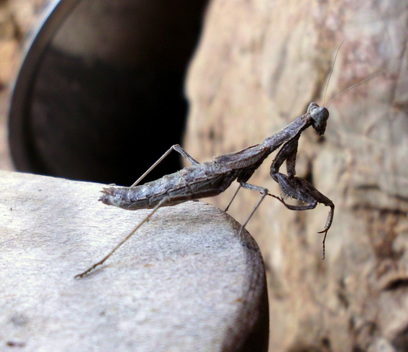 Mantis in my kitchen.
Mantis in my kitchen.
5. Wash surfaces with vinegar.
Every now and again, I wash my floor and shelves using diluted vinegar. It definitely reduces the amount of bugs and fleas wandering about.
6. Mark your territory.
Most people think I’m barmy, but I swear by this approach. I think nearly all animals understand in some vague way the concept of territory. So I’ve come up with a few utterly unproven methods of marking my space, all which worked for me:
Walking the boundary. I regularly walk round the boundary of my land. I am of the (perhaps irrational) opinon that my smell and my presence is felt by the wildlife.
Peeing. This one caused hysterics in my village, until everyone realised I never have wild boar in my land despite living next to a pomegranate orchard. Now I’ve gathered a few fellow garden pee-ers. I am almost certain the smell of human urine scares off quite a few animals including wild boar and snakes. Again this is utterly unproven, but it works for me. Seriously, not one boar has dug up my potatoes in five years, whereas my neighbour’s pomegranate orchards are continually pummelled.
Smelly plants. I have sage, oregano and rosemary at the entrance and as a boundary for my garden
Predatory and protective pets.
Nearly everyone in my village owns a dog, a cat and chickens. Dogs are fantastic for frightening off larger wild animals and protecting livestock. Cats take care of mice and snakes in incredible ninja style war games. Chickens relish scorpions and smaller snakes, and will attack mice too.
***
As mentioned above, most creatures are very useful members of my ecosystem. Here are the ones I consider outstandingly helpful and do my best to cultivate.
Critter friends you definitely want more of.
Ants. I call ants, my kitchen clean up crew. I have a huge nest on the edge of my outside kitchen and I don’t disturb it. Most nights an incredible army of six-legged troupers tidy up burrs, grass heads and much of the debris on my kitchen floor. I’ve never in five years seen ants in my honey or molasses. I’ve drawn the conclusion it’s because they’ve got plenty else to eat, so they don’t bother with my food.
Geckos, lizards and agamas. These are the second kitchen clean up team. They clean my pots, pans and dirty plates. They are also fantastic for eating mosquitos, flies and other garden pests.
Skinks. Again these are nature’s cleaners, much like lizards. They’re also a boon in the composting toilet.
Praying mantis. The mantis is nature’s ultimate assassin. They’ll even take down a scorpion if not drastically outsized. This green stealth killer will also help rid your garden and outside spaces of various bugs and pest, including the potentially devastating aphids.
Toads and frogs. I have two toads, one in the bathroom and one in the kitchen. Flies, mosquitos and slugs and bugs are their favourite fare.
Hover flies. These will eat those treacherous leaf-munching aphids.
Wasps. Don’t kill them. They feed on the eggs of many garden pests.
Spiders. These are your local pest-control service. If you don’t have spiders, worry. You may be risking a pest outbreak.
Dragonflies. These are beautiful to look at, and happily feed on those wretched aphids.
Bees. Well, obviouslyJ
Ladybugs. These feed on aphids and mites.
Ground Beetles. These hunt slugs, snails, cutworms and other pests in your soil.
Tachinid flies burrow their way into caterpillars, which must be terrible for the grub, but good for your cabbages.
Every now and again, I wash my floor and shelves using diluted vinegar. It definitely reduces the amount of bugs and fleas wandering about.
6. Mark your territory.
Most people think I’m barmy, but I swear by this approach. I think nearly all animals understand in some vague way the concept of territory. So I’ve come up with a few utterly unproven methods of marking my space, all which worked for me:
Walking the boundary. I regularly walk round the boundary of my land. I am of the (perhaps irrational) opinon that my smell and my presence is felt by the wildlife.
Peeing. This one caused hysterics in my village, until everyone realised I never have wild boar in my land despite living next to a pomegranate orchard. Now I’ve gathered a few fellow garden pee-ers. I am almost certain the smell of human urine scares off quite a few animals including wild boar and snakes. Again this is utterly unproven, but it works for me. Seriously, not one boar has dug up my potatoes in five years, whereas my neighbour’s pomegranate orchards are continually pummelled.
Smelly plants. I have sage, oregano and rosemary at the entrance and as a boundary for my garden
Predatory and protective pets.
Nearly everyone in my village owns a dog, a cat and chickens. Dogs are fantastic for frightening off larger wild animals and protecting livestock. Cats take care of mice and snakes in incredible ninja style war games. Chickens relish scorpions and smaller snakes, and will attack mice too.
***
As mentioned above, most creatures are very useful members of my ecosystem. Here are the ones I consider outstandingly helpful and do my best to cultivate.
Critter friends you definitely want more of.
Ants. I call ants, my kitchen clean up crew. I have a huge nest on the edge of my outside kitchen and I don’t disturb it. Most nights an incredible army of six-legged troupers tidy up burrs, grass heads and much of the debris on my kitchen floor. I’ve never in five years seen ants in my honey or molasses. I’ve drawn the conclusion it’s because they’ve got plenty else to eat, so they don’t bother with my food.
Geckos, lizards and agamas. These are the second kitchen clean up team. They clean my pots, pans and dirty plates. They are also fantastic for eating mosquitos, flies and other garden pests.
Skinks. Again these are nature’s cleaners, much like lizards. They’re also a boon in the composting toilet.
Praying mantis. The mantis is nature’s ultimate assassin. They’ll even take down a scorpion if not drastically outsized. This green stealth killer will also help rid your garden and outside spaces of various bugs and pest, including the potentially devastating aphids.
Toads and frogs. I have two toads, one in the bathroom and one in the kitchen. Flies, mosquitos and slugs and bugs are their favourite fare.
Hover flies. These will eat those treacherous leaf-munching aphids.
Wasps. Don’t kill them. They feed on the eggs of many garden pests.
Spiders. These are your local pest-control service. If you don’t have spiders, worry. You may be risking a pest outbreak.
Dragonflies. These are beautiful to look at, and happily feed on those wretched aphids.
Bees. Well, obviouslyJ
Ladybugs. These feed on aphids and mites.
Ground Beetles. These hunt slugs, snails, cutworms and other pests in your soil.
Tachinid flies burrow their way into caterpillars, which must be terrible for the grub, but good for your cabbages.
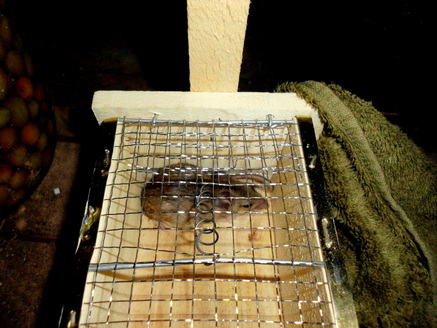 The game's up mouse! I've got you.
The game's up mouse! I've got you.
Five beasts I'm less tolerant with, and how I deal with them:
Everything has its place in nature. The key is balance. I’ve noticed the following animals can soon swarm out of balance due to climatic conditions or human interference (the use of chemical fertilisers and herbicides decimates the friendly critters leaving these more hardened criminals run rampage).
Aphids. Yes, it must be clear by now, I don’t like them because they can fast turn into a plague. Cultivating aphid-eaters and clearing tall grass or dead leaves is crucial. But if they descend on your baby almond tree, then spraying with rosemary and lavender water could work, though you have to spray regularly. On the brighter side of aphids, the cricket serves a crucial function in helping to break down mulch so that plants can access the nutrients.
Fleas. There are only two things I’ve found to work consistently for fleas: Bicarbonate of soda (I use it liberally on my dog like flea powder), and diatomaceous earth.
Mosquitos. Why are there so many mosquitos? It’s one of life’s unanswered mysteries. Citronella oil is the only truly mozzie-deterring natural remedy that works. Basil plants? Meh. I’ve planted masses of basil everywhere, and still get bitten. Let’s face it, it only takes one mosquito to ruin your evening. Ultimately the mosquito net is your best defense. And the joy of hearing that rapacious little scourge buzzing at your net unable to eat you is unparalleled.
Mice. Yes, so many potential solutions out there on the web, none of which worked for me. Humane traps were the only way I managed to rid myself of them.
Caterpillars. Birds birds birds. Failing that I’ve found throwing the washing up bowl over my cabbages and broccoli the best solution.
Everything has its place in nature. The key is balance. I’ve noticed the following animals can soon swarm out of balance due to climatic conditions or human interference (the use of chemical fertilisers and herbicides decimates the friendly critters leaving these more hardened criminals run rampage).
Aphids. Yes, it must be clear by now, I don’t like them because they can fast turn into a plague. Cultivating aphid-eaters and clearing tall grass or dead leaves is crucial. But if they descend on your baby almond tree, then spraying with rosemary and lavender water could work, though you have to spray regularly. On the brighter side of aphids, the cricket serves a crucial function in helping to break down mulch so that plants can access the nutrients.
Fleas. There are only two things I’ve found to work consistently for fleas: Bicarbonate of soda (I use it liberally on my dog like flea powder), and diatomaceous earth.
Mosquitos. Why are there so many mosquitos? It’s one of life’s unanswered mysteries. Citronella oil is the only truly mozzie-deterring natural remedy that works. Basil plants? Meh. I’ve planted masses of basil everywhere, and still get bitten. Let’s face it, it only takes one mosquito to ruin your evening. Ultimately the mosquito net is your best defense. And the joy of hearing that rapacious little scourge buzzing at your net unable to eat you is unparalleled.
Mice. Yes, so many potential solutions out there on the web, none of which worked for me. Humane traps were the only way I managed to rid myself of them.
Caterpillars. Birds birds birds. Failing that I’ve found throwing the washing up bowl over my cabbages and broccoli the best solution.
Beasts that get a bad rap, but are pretty reasonable once you get to know them.
Snakes, spiders and scorpions have the misfortune of not being pretty. They can also be very poisonous. In reality, these animals account for very few injuries and deaths, far less than the motor car, the shot gun, or the selfie stick. They don’t hunt humans, and have no desire to waste their poison on us as it’s a very valuable, last-resort defense mechanism. Given any opportunity to run, they will (with the exception of the black mamba, which is by all accounts a psychopath).
Do you have any tried and tested remedies? If so, please add them in the comments. I'm always ready to learn a new trick.
Snakes, spiders and scorpions have the misfortune of not being pretty. They can also be very poisonous. In reality, these animals account for very few injuries and deaths, far less than the motor car, the shot gun, or the selfie stick. They don’t hunt humans, and have no desire to waste their poison on us as it’s a very valuable, last-resort defense mechanism. Given any opportunity to run, they will (with the exception of the black mamba, which is by all accounts a psychopath).
Do you have any tried and tested remedies? If so, please add them in the comments. I'm always ready to learn a new trick.

